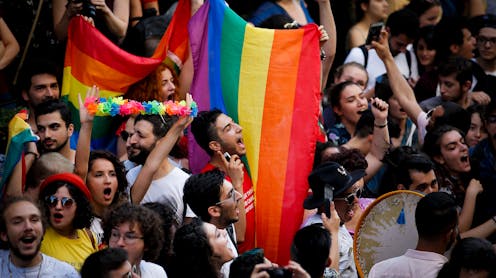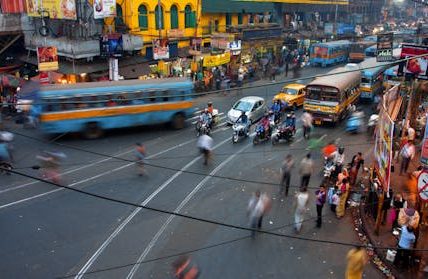‘Lived experience’ is valued in activism – but is it doing more harm than good?
A Pride march in Istanbul, 2018. Lumiereist/Shutterstock
The idea of “lived experience” – knowledge gained through direct, personal experience – is now central in activism, academia and politics. Popularised by feminist thinkers like Simone de Beauvoir and concepts like standpoint theory, it makes sense that people see the world differently based on what they’ve been through. And movements like #MeToo showed how sharing personal stories, particularly for oppressed, marginalised or victimised groups, can drive real change.
Lived experience lends authority to those long excluded from public debate, offering insight traditional expertise may miss. But it also raises questions about who gets to speak. Those without direct experience of an issue can find their place in activism questioned.
High-profile cases like Rachel Dolezal and Andrea Smith, activists who falsely claimed black and Native American ancestry, respectively, highlight how powerful the claim to lived experience has become – so much so that some feel compelled to lie about it in order to be heard.
My research, based on in-depth interviews with 20 activists from a range of movements and backgrounds across Europe, India and the US, shows what challenges arise when lived experience is treated as the ultimate credential in activism. The interviewees revealed how emphasis on personal testimony can shift activism away from political action, toward guilt, polarisation and disengagement.
This matters, because it affects who feels able to participate in movements pushing for social change.
One trans activist stressed the importance of lived experience in leading the fight for transgender rights, warning that without trans voices at the centre, the movement risks overlooking key perspectives that are often absent from research and politics.
For others, the emphasis on lived experience creates internal dilemmas. Activists without lived experience can feel unsure of their place. One white anti-racist activist based in the UK put it this way: “I would definitely be silent in a lot of things, and I wouldn’t be proud of it. But I wouldn’t have the right to speak up.”
Another white female activist working in international development described a growing discomfort with her role: “I fundamentally question whether I have legitimacy in leadership. Can I legitimately show up? Or do I just need to leave the development sector entirely?”
Want more politics coverage from academic experts? Every week, we bring you informed analysis of developments in government and fact check the claims being made.
Sign up for our weekly politics newsletter, delivered every Friday.
In some activist spaces, speaking without relevant lived experience is seen as a transgression. Identity becomes a kind of moral litmus test for who gets to speak and lead.
Activists described an overwhelming sense of guilt about their own social advantages. One reflected on how acknowledging those advantages, by recognising the privileges they hold (and their subsequent lack of marginalised lived experience) can be a barrier to activism: “I think it is important to engage in self-awareness, but sometimes it moves into self-criticism. You can stall if you’re always feeling guilty.”
One interviewee observed a “collective inertia” among allies, activists and academics who, unsure of their place, chose silence over action.
Another described how guilt about having a privileged lived experience shifts the focus away from collective political action and toward perfecting the self — a kind of confessional self-work that risks becoming inward-focused, rather than leading to meaningful social change.
These comments reflect concerns raised in social justice research about how guilt, humility and lived experience can shape or stall activism. My findings suggests that while lived experience remains vital, the way it’s used matters — when it isolates rather than unites, or fuels self-focus over action, we need to use it more carefully, in ways that build connection and drive change.
Identity, experience and diversity of opinion
Some activists strongly defended the idea that those with the least privilege should have the most say. As one LGBTQ+ activist put it: “The person who has the least privilege in society gets to decide what is true. If you’re straight and cis, and you’re a guy, middle-aged, and white, check your privileges.”
While this perspective centres voices long pushed to the margins, it can also wrongly assume everyone with a particular lived experience will have the same views on an issue.
Many writers and philosophers, such as Frantz Fanon, have challenged the idea that identity alone dictates political outlooks. As British writer Kenan Malik recently argued: “Black and Asian communities are as politically diverse as white communities.”
Latino and black voters’ support for Donald Trump in the US has challenged many people’s assumptions about how identity dictates political allegiance.
A Black Lives Matter march in London, June 2020.
Avel Shah/Shutterstock
This tension has prompted some activist organisations to rethink their approach. The UK charity Migrant Rights Network shifted their messaging from “lived experience-led” activism to “lived experience and values-led” activism in 2023.
They argued that figures like Rishi Sunak and Suella Braverman demonstrate that lived experience alone does not guarantee shared values. Both come from immigrant backgrounds and have experienced racism, yet their support for restrictive immigration policies has led critics to question whether their personal histories count as valid lived experience.
At the heart of this is an uncomfortable question: should lived experience only be recognised when it aligns with certain political values?
A way forward
My research suggests that if we only value lived experience when it confirms our own views, we risk turning it into a selective tool rather than a genuine commitment to listening.
If we say lived experience matters, we have to be willing to engage with it across the spectrum — even when it challenges us. That doesn’t mean we have to agree, but it does mean staying open to dialogue.
None of this means lived experience should be dismissed – it provides essential insight into how injustice is felt, understood and navigated by those most affected. However, when it becomes the sole measure of credibility, it can create divisions within activist spaces and silence people who want to contribute.
A more productive approach would be to view lived experience not as the final word or the end of a conversation, but as a starting point — one that invites listening, dialogue and ultimately, collective action.
As one activist in my study reflected: “If you take the time to talk and listen, you’re not disqualified just because you didn’t grow up in that context. The key is humility.”
Dr Jody Moore-Ponce does not work for, consult, own shares in or receive funding from any company or organisation that would benefit from this article, and has disclosed no relevant affiliations beyond their academic appointment.


